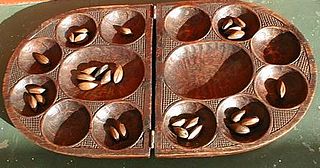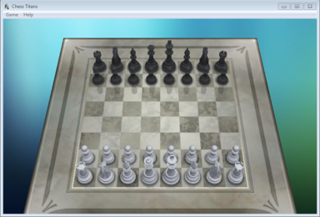
Deep Blue was a chess-playing expert system run on a unique purpose-built IBM supercomputer. It was the first computer to win a game, and the first to win a match, against a reigning world champion under regular time controls. Development began in 1985 at Carnegie Mellon University under the name ChipTest. It then moved to IBM, where it was first renamed Deep Thought, then again in 1989 to Deep Blue. It first played world champion Garry Kasparov in a six-game match in 1996, where it lost four games to two. It was upgraded in 1997 and in a six-game re-match, it defeated Kasparov by winning two games and drawing three. Deep Blue's victory is considered a milestone in the history of artificial intelligence and has been the subject of several books and films.
A solved game is a game whose outcome can be correctly predicted from any position, assuming that both players play perfectly. This concept is usually applied to abstract strategy games, and especially to games with full information and no element of chance; solving such a game may use combinatorial game theory and/or computer assistance.
The Computer Olympiad is a multi-games event in which computer programs compete against each other. For many games, the Computer Olympiads are an opportunity to claim the "world's best computer player" title. First contested in 1989, the majority of the games are board games but other games such as bridge take place as well. In 2010, several puzzles were included in the competition.
Combinatorial game theory has several ways of measuring game complexity. This article describes five of them: state-space complexity, game tree size, decision complexity, game-tree complexity, and computational complexity.
Arimaa is a two-player strategy board game that was designed to be playable with a standard chess set and difficult for computers while still being easy to learn and fun to play for humans. It was invented between 1997 and 2002 by Omar Syed, an Indian-American computer engineer trained in artificial intelligence. Syed was inspired by Garry Kasparov's defeat at the hands of the chess computer Deep Blue to design a new game which could be played with a standard chess set, would be difficult for computers to play well, but would have rules simple enough for his then four-year-old son Aamir to understand.

Oware is an abstract strategy game among the mancala family of board games played worldwide with slight variations as to the layout of the game, number of players and strategy of play. Its origin is uncertain but it is widely believed to be of Ashanti origin.

David Neil Laurence Levy is an English International Master of chess and a businessman. He is noted for his involvement with computer chess and artificial intelligence, and as the founder of the Computer Olympiads and the Mind Sports Olympiads. He has written more than 40 books on chess and computers.
World Computer Chess Championship (WCCC) is an event held periodically since 1974 where computer chess engines compete against each other. The event is organized by the International Computer Games Association. It is often held in conjunction with the World Computer Speed Chess Championship and the Computer Olympiad, a collection of computer tournaments for other board games. Instead of using engine protocols, the games are played on physical boards by human operators.
Hydra was a chess machine, designed by a team with Dr. Christian "Chrilly" Donninger, Dr. Ulf Lorenz, GM Christopher Lutz and Muhammad Nasir Ali. Since 2006 the development team consisted only of Donninger and Lutz. Hydra was under the patronage of the PAL Group and Sheikh Tahnoon Bin Zayed Al Nahyan of Abu Dhabi. The goal of the Hydra Project was to dominate the computer chess world, and finally have an accepted victory over humans.

An endgame tablebase is a computerized database that contains precalculated exhaustive analysis of chess endgame positions. It is typically used by a computer chess engine during play, or by a human or computer that is retrospectively analysing a game that has already been played.

Rybka is a computer chess engine designed by International Master Vasik Rajlich. Around 2011, Rybka was one of the top-rated engines on chess engine rating lists and won many computer chess tournaments.

Vasik Rajlich is an International Master in chess and the author of Rybka, previously one of the strongest chess playing programs in the world. Rajlich is a dual Czechoslovakian-American citizen by birth; he was born in the United States of America to Czech parents, at that time graduate students, but grew up in Prague. He later spent years in the United States as a student, graduating from MIT.
World Computer Speed Chess Championship is an annual event organized by the International Computer Games Association where computer chess engines compete against each other at blitz chess time controls. It is held in conjunction with the World Computer Chess Championship. Up to 2001, it was held in conjunction with the World Microcomputer Chess Championship (WMCCC) and restricted to microcomputers.

Chess Titans is a chess video game with 3D graphics developed by Oberon Games and included in Windows Vista and Windows 7 Home Premium, Professional, Enterprise, and Ultimate. It is a fully 3D animated, photorealistic interactive chess game with ten difficulty levels when played against the computer. It can be played by two participants, or one player against the computer.

Henri Elle Bal is a professor of computer science at the Vrije Universiteit, Amsterdam in the Netherlands. He is a well-known researcher in computer systems with a specialization in parallel computer systems, languages, and applications.
There are a number of competitions and prizes to promote research in artificial intelligence.
Computer Arimaa refers to the playing of the board game Arimaa by computer programs.
In computer science, Monte Carlo tree search (MCTS) is a heuristic search algorithm for some kinds of decision processes, most notably those employed in software that plays board games. In that context MCTS is used to solve the game tree.
Top Chess Engine Championship, formerly known as Thoresen Chess Engines Competition, is a computer chess tournament that has been run since 2010. It was organized, directed, and hosted by Martin Thoresen until the end of Season 6; from Season 7 onward it has been organized by Chessdom. It is often regarded as the Unofficial World Computer Chess Championship because of its strong participant line-up and long time-control matches on high-end hardware, giving rise to very high-class chess. The tournament has attracted nearly all the top engines compared to the World Computer Chess Championship.

A chess variant is a game related to, derived from, or inspired by chess. Such variants can differ from chess in many different ways.








